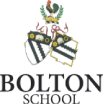
The penultimate Perspectives Lecture of the academic year at Bolton School gave focus to those careers that utilise Mathematics and Statistics. Three former students delivered virtual presentations aimed at pupils in Year 9 and above, parents and alumni along with other members of the School and local community.
Shouma Khan (Class of 1991) opened the evening, telling how, after an enjoyable time at Bolton School during the 1980s, he had gone on to study Mathematics and Statistics at Bristol University. He explained how he then secured a role with Ernst & Young in London, a move which, he said, felt like a natural fit for him. He recounted how his time with one of the ‘big four’ accounting firms also included an enjoyable year in Sydney. From there, he moved to Mars Confectionery, undertaking a role with the data team, helping to direct the business and where, over the course of his four years with them, he was involved with the launch of new products and innovations.
Shouma told how, in 2004, he transferred to Disney, where he was employed for the next ten years, dealing with ever bigger and more immersive datasets. From there he moved across to CNN, where he recalled working on the commercial side of the business for over 5 years in what he thought was a fantastic organisation. His last two roles – in a retro gaming start-up and in his current role as CFO with Nexus, a highly regarded animation studio - have seen him working with complex financial information as he has become the trusted go-to advisor within the business. He ended by saying that Maths and Stats had most definitely underpinned all the work that he had done and had allowed him to work across a number of industries and sectors with some highly reputable brands.
Tom Cowling told how he had started at Bolton School aged 4 and had left in 2011 with A-Levels in Maths, Further Maths, Economics and Physics. Having enjoyed the combination of Maths and essay writing that Economics offered, he had gone on to study it at Durham University. Upon graduating in 2014, Tom said he wasn’t 100% sure what job he wanted to do and advised pupils not to worry too much if this applied to them too. He recalled how he applied for a range of roles from asset management to accountancy before securing a position as an Actuarial Analyst at Grant Thornton in London. He explained how actuaries use Maths to predict the future and how he uses lots of statistical modelling to predict the chances of things happening. The work of an actuary, he said, splits into three fields: pensions, life insurance and non-life insurance, which further breaks down into personal insurance and bigger risk, commercial insurance.
Tom told how he had become a full Actuary in December 2020 after sitting some pretty gruelling exams. He explained that for the past three and a half years, he has worked at Markel International, a London market insurer, where his focus is on setting reserves for a number of insurance products, covering a wide range of risks from racehorses to accidents on oil rigs to cyber threats. Tom revealed how there is a good deal of work in this field as London is, and has been, the centre of specialist insurance since the 1600s.
Addressing the question of which skills you need to be successful in his line of work, Tom said that you definitely need Maths in order to understand the models you work with, that you need to be comfortable with data, and that communication skills are important, explaining that you need to be clear and confident in reaching and standing by your conclusions. Increasingly, he said, programming was becoming more and more important too. When considering why you should pursue a career using Maths and Stats, he said an important factor for him, as an Actuary, was that it pays well but that it still gives you a reasonable work-life balance. He also spoke about enjoying the unique intellectual challenges that his job presents him with on a daily basis.
Shivam Patel (Class of 2019) is a more recent leaver but his thoughts proved equally pertinent. Reflecting on his time at Bolton School, where he studied from Year 5 onwards, Shivam told how playing sport and music provided some of his favourite memories; passions which he still pursues today. He recounted how he left with A levels in Maths, Further Maths and Physics and went on to study Mathematics, Optimisation and Statistics at Imperial College London. He reflected on how applying to university is an intense time and recalled taking extra Maths assessments and going for interviews. When choosing what to study, he advised the audience to think beyond your school subjects and to undertake plenty of research, be that through reading or through watching You Tube videos. He also advised, if possible, to try and get work experience. He recalled when he was at university taking part in hackathons – which were intense coding challenges. These, he said, were great experiences, which ultimately encouraged him to become a Software Developer. Upon completion of his degree, he knew he wanted to use Maths and programming in his job. Whilst he undertook work as a Data Analyst for a few months, he decided to switch roles within his London-based company to become a Software Developer. He said that not having a Computer Science degree had not hindered him and he felt that if you have a passion for something, you should go for it!
Shivam reflected on how his time at university was affected by Covid, meaning his second year was all online and that he sat his exams remotely in his third year. Despite that, he spoke of getting involved with societies and of holding roles as president and secretary within club committees. Outside of his current work, he volunteers for National Hindu Students’ Forum (UK). In summation, Shivam thought that Maths skills could be applied across many careers and said that he uses them on daily basis even whilst working as a Software Developer. He also impressed upon the audience the importance of building strong presentation skills and that this could often be achieved through activities beyond the classroom or workplace.
The panel was then quizzed on a range of subjects, which saw Tom talking about how pupils can get work experience as Actuaries and what made him go down the actuarial route, Shivam explaining how he learnt coding without a Science degree and whether Maths was needed for his career and all panellists considering what soft skills they had developed over their careers, why they chose the degree that they did and whether they would do so again, and how important the company or brand is to you when applying for a job?
Watch the full presentation through this link.

Shouma Khan, Class of 1991

Tom Cowling, Class of 2011

Shivam Patel, Class of 2019























